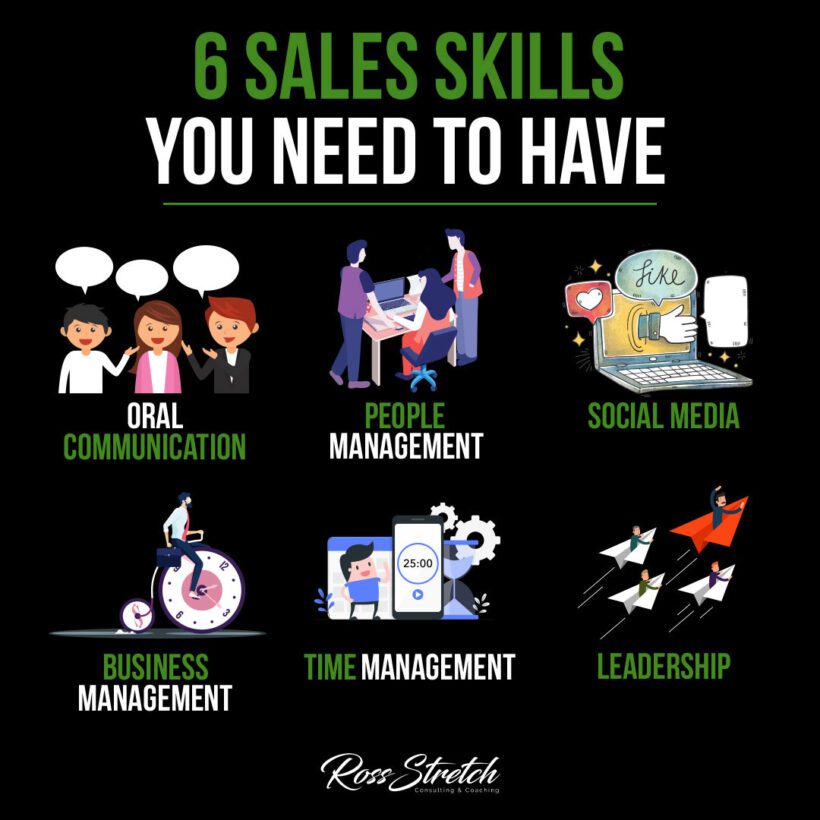Introduction
Sales is more than just pitching products—it’s about building relationships, understanding client needs, and providing value. In today’s fast-paced, competitive market, mastering essential sales skills can be the difference between hitting targets or falling short. Whether you’re just starting your sales career or you’re a seasoned professional, these six skills are crucial for long-term success. From mastering communication to understanding the power of social media, each skill will help you stand out and improve your performance in sales.
1. Oral Communication
One of the most important skills in sales is effective oral communication. Being able to clearly articulate ideas, products, or services is essential when engaging with potential clients. Persuasive communication helps you present value propositions in a way that resonates with your audience. Strong communicators ask the right questions and listen to their clients, enabling them to offer tailored solutions.
Improving your communication skills starts with practice—be mindful of your tone, clarity, and how well you listen. Role-playing sales conversations and getting feedback from peers can greatly enhance your abilities. In fact, research shows that sales professionals who actively improve their communication skills see higher conversion rates, demonstrating how impactful this skill can be on your overall success.
2. People Management
Managing people is a critical component of sales, whether you’re leading a team or managing client relationships. Good people management skills foster trust, create rapport, and lead to better collaboration. For sales leaders, managing a team’s productivity, morale, and development is crucial to driving results. Even for individual contributors, managing customer relationships effectively ensures long-term partnerships and repeated business.
To excel in people management, focus on emotional intelligence—understanding and responding to others’ emotions. Empathy is key when managing both team members and clients, as it allows you to address concerns and create personalized experiences. Remember, people are at the heart of every transaction in sales, so building strong interpersonal connections is just as important as closing deals.
3. Social Media
In today’s digital age, social media has become a powerful tool for sales professionals. Platforms like LinkedIn, Facebook, and Instagram allow you to build your personal brand, connect with potential clients, and showcase your expertise. Social selling involves using social media platforms to research prospects, engage with them, and nurture relationships that eventually lead to sales opportunities.
To leverage social media effectively, it’s important to share valuable content consistently and engage with your audience. This could be in the form of industry insights, testimonials, or case studies that demonstrate the impact of your solutions. Engaging in conversations and responding to comments or messages also helps build rapport and trust. Studies show that 78% of salespeople who use social media outsell their peers who don’t, making it an essential skill in your sales toolkit .
4. Business Management
Sales professionals aren’t just product experts—they need to have a solid grasp of business management as well. Understanding the broader business environment, including market trends, competitor activity, and customer needs, can help you make strategic decisions. Sales professionals who understand business fundamentals can set realistic targets, manage budgets, and make informed decisions about which opportunities to pursue.
Key business management skills include financial literacy, project management, and resource allocation. By aligning sales efforts with the company’s business objectives, you can ensure that you’re contributing to both short-term success and long-term growth. For instance, knowing how to forecast sales and manage cash flow helps in negotiating deals that benefit both the customer and your organization. With a well-rounded understanding of business, you’ll be in a better position to lead conversations that go beyond the product, building trust and credibility with clients.
5. Time Management
Sales is a profession where time truly equals money, which makes time management an essential skill. Between prospecting, pitching, follow-ups, and closing deals, effective time management ensures that you prioritize the right activities. Without it, tasks can pile up, leading to missed opportunities or burnout.
One popular technique for improving time management in sales is the Pomodoro Technique, where you work in focused intervals (usually 25 minutes) followed by short breaks. Another effective method is time-blocking, where you schedule specific tasks during the day, such as dedicating mornings to prospecting and afternoons to client meetings. By staying organized and prioritizing high-impact activities, sales professionals can maintain a consistent flow of productivity and achieve better results.
6. Leadership
Leadership in sales is not only reserved for managers—it’s a quality that every sales professional should embody. Sales leadership is about taking initiative, inspiring others, and driving your team or organization toward success. Even if you’re not managing a team, you can show leadership by sharing best practices, mentoring new colleagues, or driving strategic initiatives that improve performance across the board.
Effective leadership also involves decision-making and adaptability. The ability to make quick, informed decisions and pivot strategies when needed is essential in today’s fast-moving sales landscape. A strong leader can motivate their team, push through challenges, and ultimately drive success. By developing leadership skills, sales professionals not only elevate their own careers but also create a positive impact within their organizations.
Conclusion
Mastering these six sales skills—oral communication, people management, social media, business management, time management, and leadership—can transform your sales career. Each of these skills complements the others, creating a well-rounded foundation that allows you to thrive in the competitive world of sales. Whether you’re managing a team, building client relationships, or focusing on personal growth, these essential skills will help you achieve greater success, close more deals, and foster long-term relationships with clients.


